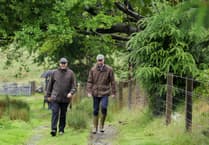DARTMOOR National Park Authority members met with the public and interest group representatives to debate the proposed changes to the park’s byelaws this week.
Byelaws are local laws for local issues. On Dartmoor, the byelaws have been in place since 1989, and protect the park by defining what can and cannot be undertaken on Access Land.
These byelaws cover everything from legal access to camping, cooking, dogs and parking.
After an increase in the use of the park throughout the pandemic, organisations such as the Dartmoor Commons Owners’ Association (DCOA) have called for a revision of the byelaws, so that they are fit to accommodate present-day pressures.
After an initial consultation in 2021, the review is aimed at ‘consolidating national and local laws and providing a single set of byelaws which are fit for purpose, proportionate and consistent.’ A final set of updated byelaws will be presented to members in early 2023.
One fundamental concern raised at the meeting was the feasibility of implementing and enforcing any changes to the byelaws, in the wake of drastic funding cuts to the Park Authority.
The Authority is already instigating redundancies and closing its award-winning visitor centre as it faces a £500,000 financial deficit. Concerns were raised about the Authority taking on further responsibilities when it is already financially stretched.
Mr Goodings, a Dartmoor local, van-user and walker, contended that if the changes to sleeping overnight in a motorhome or van went ahead, it would alienate the trusted and respected users of the park who help fill the gaps in the maintenance and protection of the land, only leaving behind ‘fly-campers’ and those who disregard byelaws anyway.
Mr Goodings said: ‘If you seek to stop people staying overnight, you will alienate those who are potential allies and when your funding is being cut, you’ll need people, people that care about this place every bit as much as you do.
‘Prohibiting access is analogous to an insecticide. If you use insecticide you’ll kill all the aphids but you will also kill all the ladybirds as well, and the aphids will come back quicker. You’ll essentially exclude the nice people, and the people who are used to flouting the laws will continue to use the space with absolute disregard.’
Landowners’ concerns were raised by John Howell, the current Chairman of the DCOA. Mr Howell, representing a majority of Dartmoor’s landowners, argued that it wasn’t just the current byelaws, but the primary legislation itself, that was to blame for much of the irresponsible behaviour in the park.
Mr Howell said: ‘The byelaws have three main functions, to safeguard the interests of the people affected by the granting of access rights; to cover the interests of the recreational users of the moor and to enable the Authority to manage that recreational use to control adverse impacts.’
‘There’s a fundamental flaw in the 1985 Act, in that rights are given for recreational activities with few responsibilities attached. While the restoration of damage caused by recreation is the responsibility of the Authority, there will always be a conflict between the Authority, moorland residents and recreational users, as long as that divorce of responsibility from rights remains a legal fact.’
However, Mr Howell also acknowledged the financial pressures that the Park was under and that enforcement of the new byelaws was tricky.
Many of the other debates were around the language used in the proposed amendments, and in questions surrounding the enforceability of the measures, such as the prohibition of Chinese lanterns.
Dogs were another point of contention, as for many farmers, they have been a cause for concern as cases of livestock attacks are reportedly increasing.
The review included a public consultation which attracted 4,000 responses. This feedback has played a key part in informing the process to amend and update existing byelaws.
Following the meeting, a definitive version of the updated byelaws will be presented to the Authority in 2023. If approved, they will be formally sealed and publicly advertised, as per Defra guidance, before being sent to the Secretary of State for confirmation.
Dartmoor National Park Authority welcomes any additional comments surrounding the changes and can be contacted at: [email protected]





Comments
This article has no comments yet. Be the first to leave a comment.